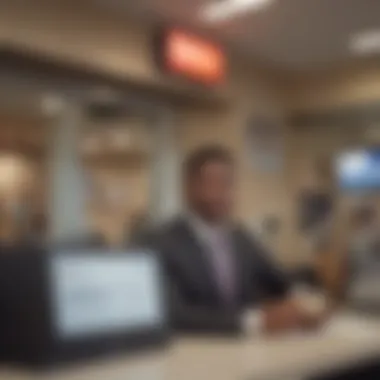Why You Need a Bank Account to Cash a Check


Intro
In today’s fast-paced world, checks are still a prevalent form of payment, despite the digital shift towards electronic transactions. However, to successfully cash a check, you often need to navigate the requirements set forth by banks and various financial institutions. This necessity raises an important question: why do you need a bank account to cash a check? The answer is layered and depends on various factors like the type of checks you receive and the methods available for cashing them. By understanding these dynamics, you can make informed decisions that suit your financial needs.
Setting Financial Goals
Cash flow management is crucial for anyone seeking to improve their financial literacy. One essential aspect of this is setting financial goals. Without clear objectives, it’s easy to drift like a ship lost at sea.
Importance of Setting Goals
Establishing financial goals gives direction to your financial journey. When aiming to cash a check, knowing whether you want to deposit it into a bank account or use alternative methods can guide your actions. These goals help in prioritizing what is necessary - thinking about accountability and tracking your funds accurately.
How to Establish Realistic Financial Objectives
To have meaningful financial objectives, it’s crucial to set realistic and achievable goals. Consider breaking them down into short-term and long-term categories. For instance:
- Short-term: cashing checks that you receive frequently and understanding the associated fees.
- Long-term: opening a bank account, which may provide more flexibility and reduce costs in the future.
Tracking Progress and Adjusting Goals
It’s important to regularly review your goals. Are they still relevant? Have your financial circumstances changed? Tracking your progress can illuminate areas where adjustments are needed. Perhaps at some point, cashing checks at your local grocery store feels more efficient — but maybe the fees are putting a dent in your budget. Being able to adapt is crucial.
Understanding Checks and Their Types
Not all checks are created equal. There are different varieties like personal, cashier's, or even government checks, each having unique requirements for cashing. Knowing which checks you may receive can help you decide whether a bank account is necessary.
Types of Checks
- Personal Checks: Commonly issued by individuals, these checks often require a bank account to cash.
- Cashier's Checks: Issued by banks and typically considered safer, these may provide more flexibility in cashing.
- Government Checks: Often easier to cash at banks, these checks might require proper identification and could still be an option for those without accounts.
Understanding the type of check you hold is pivotal in deciding how to proceed in cashing it. If it's personal and you're not linked to a bank account, you might face challenges.
Alternative Cashing Methods
If you do not have a bank account, options still exist for cashing checks. Here are some alternatives worth exploring:
- Check-Cashing Stores: While convenient, these businesses often charge higher fees than banks.
- Retail Locations: Many supermarkets or convenience stores offer check-cashing services, usually requiring valid ID and sometimes a membership.
- Money Services: Services offered by various financial institutions handle transactions without a checking account but might come with their own set of expenses.
End
Understanding the necessity and options surrounding check cashing without a bank account allows individuals to approach their financial situations with clarity. With each financial goal outlined, you can determine your path moving forward, whether it’s recognizing the importance of a bank account or finding alternative means to cash checks effectively. Making informed decisions might not be as daunting as it seems if you have your financial compass set right.
Prelims
In today’s fast-paced world, the ability to manage money is crucial. One fundamental aspect of financial management is understanding how to cash checks. This article aims to unpack the nuances of needing a bank account for check cashing. For many, cashing a check might seem like a simple task, yet a bank account can significantly ease this process.
Definition of Check Cashing
Check cashing is the act of converting a written order, typically issued by one party to another, into cash. In this process, the individual who receives the check approaches a financial institution or a check-cashing service to receive cash for the amount specified on the check. It may sound straightforward, but not every place allows cashing checks without certain prerequisites, such as having a bank account. The reasons for this vary, including security measures and the costs associated with verifying the check's authenticity.


Importance of Understanding Your Options
Being aware of your options when cashing a check can't be overstated. Without knowledge, individuals may find themselves stuck or facing unnecessary fees. For example, some people might assume that any grocery store or gas station can cash their checks. However, this isn't always true and varies by location.
Understanding the available routes can provide clarity. Some may consider using check-cashing services, while others prefer retail outlets or even mobile payment solutions. Every method comes with its pros and cons, so it’s essential to clearly evaluate them before making a decision.
Let's dive deeper into the various check types, followed by the necessity of having a bank account to streamline the cashing process.
The Basics of Check Types
Understanding the different types of checks is essential for anyone navigating the world of check cashing. Each category of check comes with its own set of rules and considerations, impacting how and where you can cash these instruments. With this knowledge, individuals can make educated decisions, especially when it comes to whether or not they need a bank account for their transactions.
Personal Checks
Personal checks are the most common type of check used today. They are typically written against an individual’s checking account, and they require the account holder's signature. When cashing a personal check, the bank or cashing service will usually verify funds are available in the account to ensure the check won't bounce.
- Considerations: Since personal checks are drawn against an individual account, the cashing institution often takes extra precautions to validate them. If the check writer has a history of insufficient funds, cashing the check could be tricky. Furthermore, cashing a personal check at a non-banking establishment often incurs higher fees, and only select locations may agree to cash them.
- How to Cash: Presenting personal checks usually requires identification, and without a bank account, you may find it a bit harder to locate a willing cashing service.
Cashier's Checks
Cashier's checks are issued directly by a bank, guaranteeing the check amounts as they are drawn against the bank’s own funds rather than an individual account. This makes them a safer option for both the issuer and the recipient.
- Benefits: Since they are backed by the bank, cashier's checks can be seen as more trustworthy. These checks are often used in larger transactions, like purchasing a car or paying a landlord.
- Cashing Options: They can typically be cashed at the issuing bank without issues, even if you don’t have an account there. However, out-of-network banks may charge higher fees or refuse to cash them.
Cashier's checks are like having the bank vouch for your funds—they're less likely to cause a hassle when cashing.
Government Checks
Government checks include payments from state or federal entities, such as tax refunds, benefits, or Social Security payments. They often come with additional protection against fraud, making them generally acceptable for cashing.
- Institutional Acceptance: Most banks and check-cashing services readily accept government checks because they are backed by the government. This acceptance stems from the reliability of funds associated with such checks, which are far less likely to bounce.
- Necessary Verification: Even though their acceptance is broader, having proper ID is still essential when cashing these checks. In any case, it’s a benefit if you have a bank account, as it often allows for quicker processing without additional fees.
Do You Need a Bank Account?
When discussing the various ways to cash a check, one pressing question pops to mind: Do you really need a bank account? This topic doesn’t just skim the surface; it digs deep into the financial realm, affecting how we manage our money and access funds. A bank account often serves as a bridge, connecting the consumer to a wider range of financial services. Not having an account can turn simple acts, like cashing a check, into a frustrating process filled with hurdles.
Explaining the Need for an Account
At the heart of the matter, the primary reason a bank account is often needed relates to trust and security. When you walk into a bank with a check, the teller is able to verify not only your identity but also the legitimacy of the check itself. It's a bit like showing a valid ticket before stepping onto a train; without that validation, you might get stuck outside looking in.
The lack of an account can lead to complications. Many banks will refuse to cash checks for non-account holders, meaning you’ll likely have to seek alternative methods that may not be as convenient. Imagine trying to cash a thousand-dollar personal check at a bank that doesn’t know you from Adam—that’s a tall order.
- Verification Process: Banks often have stringent policies for non-customers. This means presenting valid ID and possibly even additional documentation. It’s like trying to get into an exclusive club without an invitation.
- Check Types Matter: Types of checks also play a role. Personal checks might not be cashed by a bank without an account, while cashier's checks might be treated differently. Understanding the nuances can save you a headache.
Benefits of Having a Bank Account
Having a bank account doesn’t just make cashing checks easier; it opens the door to financial benefits that can improve your overall economic situation. Here are a few of the notable perks that come with maintaining an account:
- Convenience: Walking into a bank is often simpler if you have an account. You can cash checks, deposit funds, and withdraw cash all in one visit—all streamlined and quick.
- Access to Services: With a bank account, you may also gain access to overdraft protection, loans, or credit lines, which are essential for managing unexpected expenses. It’s a kind of insurance policy for your finances.
- Lower Fees: Many banks offer free check cashing for their customers, while those without an account will often face fees from third-party check cashing services. These fees can eat away at your funds faster than you can imagine.
- Financial Tracking: Keeping your funds in a bank account allows you to track your spending and savings. Banks often provide online tools and apps that can give you a clearer view of your financial health, making planning for future expenses a whole lot easier.


Alternative Check Cashing Methods
In today's world, having a bank account is quite common, yet not everyone traverses that path. For many, being able to cash a check without a bank account is essential. Understanding the alternative methods available can make life a little easier when that moment arrives. Not only does it provide options for those without a traditional banking relationship, but it also illustrates the diverse choices people can exercise regarding their finances.
Check-Cashing Services
Check-cashing services serve as a viable alternative for cashing checks without a bank account. These services can be found at dedicated outlets, some of which operate under the umbrella of larger financial companies. The most significant benefit is their accessibility, often offering extended hours that outlast those of regular banks. Think about it: how many times have you received a check and wished you had access to cash at odd hours?
However, while these services provide a way to cash checks, they come with their own set of considerations. Fees are a big factor; they can range from a small percentage of the check's value to a flat fee, depending on the amount being cashed. Often, the fees can seem steep—like a dog chasing its own tail, it may end up costing more than expected.
Another thing to keep in mind is the need for proper identification. Many of these services require at least a government-issued ID to complete the transaction. So, it’s crucial to carry your ID if you plan on visiting these providers.
Retail Store Cashing
Retail stores, such as Walmart, offer check-cashing services, presenting a convenient option for individuals without bank accounts. This method is particularly appealing due to the trust and familiarity associated with these brands. The procedures are typically straightforward: present your check at the customer service desk and provide identification.
One of the notable advantages here is that the fees are often lower than specialized check-cashing services. Some retailers even cash specific types of government checks without charging any fees at all—a real feather in the cap for those on a tight budget.
However, it’s important to remember that there are limits. Retailers usually have a cap on the maximum amount they will cash. So, for larger checks, you might still need to explore other alternatives.
Mobile Payment Solutions
In the age of smartphones, mobile payment solutions have emerged as an innovative way to cash checks without needing a traditional banking setup. Services like PayPal, Venmo, or Cash App can transform a paper check into immediate funds. All you have to do is take a picture of the check and upload it through the app. Just like that, your funds can be available in your mobile wallet, ready to be used.
This method is not only quick but also convenient, eliminating the hassle of transporting a physical check and making arrangements to cash it elsewhere. Though this option is appealing, one must consider potential fees associated with these platforms, especially if you're receiving a check that exceeds specific limits or if an instant access feature is used.
Remember: Each method has its own set of fees, limits, and requirements, making it vital to evaluate your options carefully.
Fees and Costs of Cashing a Check
When discussing the process of cashing a check, one cannot overlook the aspect of fees and costs associated with it. These fees can vary significantly based on the method chosen to cash a check and whether a bank account is involved. Understanding these costs is crucial as it heavily impacts the decision-making process for individuals looking to get their hands on their funds efficiently and without excessive expenditure.
Bank Fees
Banks often charge a variety of fees for cashing checks, especially for non-account holders. Here’s how it typically breaks down:
- Check Cashing Fee: If you don’t have an account at the bank where the check is drawn, you will likely incur a fee. This fee can range from a flat rate—often around $5 to $10—or a percentage of the total check amount, sometimes up to 2-5%, depending on the bank.
- Overdraft Fees: If you’re cashing a check against your account with insufficient funds, overdraft fees can accumulate quickly. These fees can be detrimental, even exceeding the check's value itself, leading to a negative financial impact.
- Other Service Charges: Some banks might impose additional fees for serving non-customers, like identity verification charges or specific transaction fees.
Understanding these fees helps assess if using a bank is financially advisable. It’s always a good idea to speak with a bank representative and carefully read any disclosure documents pertaining to fees prior to cashing a check at the institution.
Cashing Services Fees
When turning to check-cashing services, such as independent cashing establishments or specialized check cashers, the fee structure can look quite different:
- Flat Fees: These services often charge a flat fee per check, which can be higher than bank fees. It is not unusual for these fees to be around 3% to 10% of the check amount.
- Percentage Fees: Some services take a cut based on the total dollar amount. For a high-value check, this could mean a hefty charge compared to a small check.
- Membership Fees: Certain cashing services offer memberships with the promise of lower fees; however, these memberships can require upfront costs and may not always be worth it.
Evaluating the different check cashing providers can uncover hidden fees. A knowledgeable customer should inquire about all potential costs before deciding on a service to avoid sticker shock later.
Consideration of Costs vs. Benefits


When faced with the task of cashing a check, weighing the costs against the benefits is essential for making an informed decision. Here are some key factors to consider:
- Convenience Vs. Cost: For individuals without a bank account, the convenience of a quick cashing service might outweigh the higher fees involved. However, for those with accounts, utilizing the bank's service might be more financially wise.
- Speed of Access to Funds: Sometimes, speed can justify costs. If an emergency arises, cashing at a service that charges higher fees might be preferable to waiting for certain bank processing times.
- Long-term Financial Implications: Continually relying on high-fee check-cashing services can siphon off a significant portion of income over time. It’s prudent to consider whether the costs align with one’s overall financial health in the long run.
"In a world full of check-cashing choices, understanding the fees involved and evaluating the benefits is akin to navigating a financial minefield. Choose wisely to avoid unexpected explosions in your budget."
In summary, the fees associated with cashing a check, whether at a bank or via a cashing service, deserve close examination. Each approach comes with its unique set of costs, and the decision ultimately hinges on personal financial situations and the value placed on convenience.
Consequences of Not Having a Bank Account
When it comes to cashing checks, not having a bank account can really tie you up in knots. While it might seem like a minor inconvenience at first, the repercussions can ripple through various aspects of your financial life. Understanding what happens when you can't access a bank account for cashing checks is crucial, as this knowledge arms you with the ability to make informed decisions about your finances.
Accessibility Issues
Imagine finding yourself in a pinch, holding a check in your hand, but lacking a bank account. You might think, "No big deal, I can just cash it at a store or a check-cashing service." Well, hold your horses. Not all establishments are created equal when it comes to cashing checks. This inaccessibility can quickly turn into a hassle, especially if you live in a rural area or a neighborhood without nearby financial institutions.
- Limited Options: Without an account, your options are narrowed. You may have to travel farther to find a check-cashing service or retail store willing to cash your check, incurring costs that cut into your finances.
- Time Constraints: Relying on check-cashing services often means waiting in line and dealing with strict operational hours. This can be a particular headache if your schedule is already jam-packed.
- Higher Fees: More often than not, these alternative services come with fees that can be a substantial percentage of the check amount. All those fees add up; suddenly, your check isn’t looking so substantial any longer.
Accessibility isn't just a matter of convenience; it directly impacts your financial situation.
Potential Risks and Scams
Outside of inaccessibility, there are more sinister consequences of not having a bank account when cashing checks. In a world full of opportunists, folks without bank accounts may find themselves more susceptible to risks and scams. Let's dive into some of these dangers:
- Predatory Check-Cashing Services: Some ill-intentioned check-cashing services specifically target individuals without bank accounts, laying on exorbitant fees like molasses on pancakes. It's vital to scrutinize any service you visit, as some may play a deceitful game, offering enticingly low fees only to conceal hidden charges until the transaction is complete.
- Identity Theft: Carrying around checks, especially if they haven't yet been cashed, could expose you to identity theft. If someone gets their hands on your personal information, say goodbye to your hard-earned money.
- Falsified Checks: Without the legitimacy checks that banks provide, you might unknowingly cash a falsified check. This can have various repercussions, including being held accountable for any losses incurred by the check’s originator.
"The absence of a bank account creates risks that go far beyond mere inconvenience. Individuals could find themselves caught in a web of fraud or exploitation that threatens their financial stability."
Understanding these potential dangers is essential for anyone navigating the landscape without a bank account. It's a tough world, but knowing the risks out there is half the battle.
Epilogue
In today's financial landscape, grasping the importance of having a bank account to cash a check goes beyond mere compliance with standard procedures. It’s about understanding your financial options and ensuring a smooth experience when you receive a check. Cashing a check without an account can lead to unnecessary complexities, heightened fees, and even potential security risks.
Having a bank account offers several benefits:
- Safety and Security: You reduce the risk of theft or loss associated with carrying cash.
- Lower Fees: Banks typically impose lower fees on check cashing, in contrast to cashing services, which can be exorbitant.
- Account Accessibility: You gain access to a range of banking services that facilitate easier transactions, not only in cashing a check but also in managing your finances efficiently.
Choosing to open a bank account can streamline your financial dealings and provide peace of mind knowing there's a secure place for your funds. Plus, it allows for direct deposit options and a wider variety of financial services such as loans and credit facilities.
Recap of Key Points
To summarize, here are the vital takeaways from this discussion:
- A bank account is often essential for conveniently cashing a check while minimizing costs.
- Various check types can be cashed; understanding which method works best for you can influence costs and convenience.
- Fees associated with different cashing methods vary, so it's essential to weigh these against the benefits of having a bank account.
- Not having an account can lead to accessibility issues and increased risk of falling victim to scams or unfair practices.
Final Thoughts on Check Cashing Options
The variety of options available for cashing checks presents both opportunities and challenges. Ultimately, maintaining a bank account proves beneficial in more ways than just cashing checks. It opens doors to a more secure, organized, and efficient management of your finances.
Before making decisions, consider your checking habits, the types of checks you typically receive, and how frequently you might need those funds. Weigh these factors against the advantages of being an account holder and the potential pitfalls of working without one. Understanding these dynamics is crucial in helping you navigate the often murky waters of financial transactions.
"In the end, the most potent tool is knowledge; it’s what empowers you to make informed decisions that shape your financial future."
Ultimately, whether you’re a seasoned financial player or a newcomer feeling overwhelmed by the options, clarity comes with understanding. Evaluating your own check cashing needs against the backdrop of what a bank account provides can steer you toward a path of smarter financial health. The choice remains yours, but arming yourself with information is the first step.



